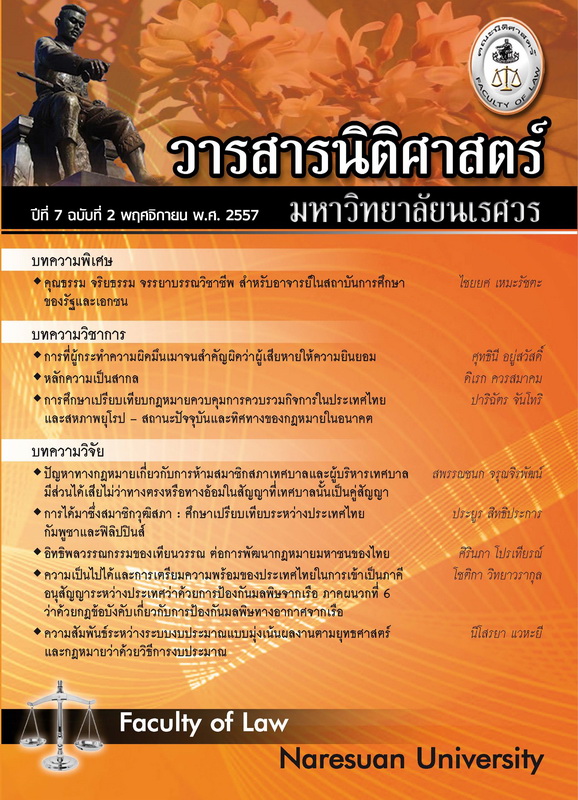Relationship between Strategic Performance Based Budgeting Systemand law on the Budgetary Procedures
Main Article Content
Abstract
Since the reform of national budgeting system to strategic performance based budgeting system in 2002, the improvement of law on the budgetary procedures has not yet been made in accordance with the major principles of such budgeting system which leads to inability of the executive branch of government to use budget as an administrative tool in an efficient manner. Moreover, it is a loophole leading to corruption and destruction of fiscal discipline as follows: 1) budget planning and budget formulation puts more accents on budget allocation made by political party policy than allocation for country and sustainable development 2) budget adoption by the parliament emphasizes on budget increase or decrease rather than the final budget outcomes 3) budget execution still puts more emphasis on control than devolution as provided by public service agreement (PSA) and 4) law on the budgetary procedures still does not put accent on outcomes assessment. The researcher proposes the improvement of law on the budgetary procedures in order to ensure budget execution which aims to strategic outcomes and harmonizes with any laws. The approach also provides the Budget Policy Committee plays a vital role in planning and formulating budget. Besides, the modification of annual budget bill as well as other necessary budget documents is offered by this research in order that the budget could be taken into account by the legislative branch of parliament in a more careful manner.
Article Details
References
คณะบุคคลสร้างสรรค์งานวิจัยเศรษฐกิจการคลัง. โครงการศึกษาวิจัย การปฏิรูประบบงบประมาณของไทยเพื่อต่อต้านการทุจริต. ม.ป.ท.: ม.ป.พ., 2555.
จรัส สุวรรณมาลา. ระบบงบประมาณและการจัดการแบบมุ่งผลสำเร็จในภาครัฐ : ความสัมพันธ์ระหว่างรัฐกับพลเมืองยุคใหม่. กรุงเทพฯ : ธนรัชการพิมพ์, 2546.
ทิพวรรณ หล่อสุวรรณรัตน์. การปฏิรูประบบงบประมาณในประเทศไทย : กรณีศึกษาเรื่องการจัดเตรียมงบประมาณในปีงบประมาณ พ.ศ. 2546. กรุงเทพฯ: แซทโฟร์พริ้นติ้ง, 2546.
พัลลภ ศักดิ์โสภณกุล. วิวัฒนาการกฎหมายวิธีการงบประมาณและการปฏิรูประบบงบประมาณของประเทศไทย. กรุงเทพฯ: วัฒนาพานิช, 2547.
รายงานทีดีอาร์ไอ. พัฒนาการนโยบายการเงินและการคลังของไทยในทศวรรษ 2540. กรุงเทพฯ : ม.ป.ท., 2551.
สถาบันวิจัยและให้คำปรึกษาแห่งมหาวิทยาลัยธรรมศาสตร์. รายงานฉบับสมบูรณ์ : โครงการศึกษาวิจัยเรื่อง การศึกษากฎหมายเกี่ยวกับมาตรฐานกลางทางการเงินการคลังและการงบประมาณ. กรุงเทพฯ : อุดมศึกษา, 2552.
สถาบันวิจัยสังคม จุฬาลงกรณ์มหาวิทยาลัย. รายงานฉบับสมบูรณ์ : การเพิ่มประสิทธิภาพการนำระบบงบประมาณแบบมุ่งเน้นผลงานตามยุทธศาสตร์ไปปฏิบัติ. ม.ป.ท.: ม.ป.พ., 2553.
สำนักงบประมาณ สำนักนายกรัฐมนตรี. การปรับปรุงระบบการจัดการงบประมาณ. กรุงเทพฯ: ม.ป.ท, 2542.
สิทธิพร พูลสวัสดิ์. “วิเคราะห์ผลกระทบของงบกลางต่อการขยายตัวของผลผลิตและการกระจายรายได้.” วิทยานิพนธ์เศรษฐศาสตรมหาบัณฑิต คณะเศรษฐศาสตร์ มหาวิทยาลัยธรรมศาสตร์, 2551.
อรพิน ผลสุวรรณ์ สบายรูป. กฎหมายการคลัง. พิมพ์ครั้งที่ 2. กรุงเทพฯ: โรงพิมพ์เดือนตุลา, 2552.
Budget Bureau Ministry of Finance. "Understanding The Japanese Budget." Last modified 2004. Accessed December 4, 2012, from https://www.mof.go.jp/english/budget/budget/fy2004/brief/index.html.
Hawke, Lewis. Performance Budgeting in Australia. OECD Journal on Budgeting, 7, no.3 (2007): 1-15.
New Zealand Government. Putting It Together An Explanatory Guide to New Zealand’s State Sector Financial Management System Version 1.1. n.p., 2011.
Office of management and budget OMB. "Circular No. A–11 (2012) Part 1 General Information." Last modified 2012. Accessed March 5, 2013: from https://www.whitehouse.gov/sites/ default/files/omb/assets/a11_current_year/s10.pdf.


